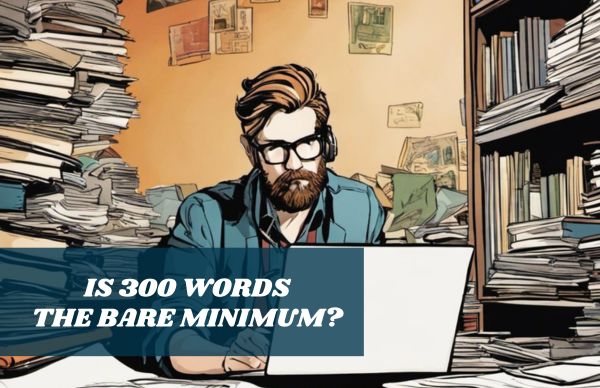Navigating the blogging world often brings up questions about ideal post length. “Do all blog posts need to be at least 300 words?”
Not necessarily.
While longer posts can delve deep into topics, shorter ones have their own charm and effectiveness.
Keep reading to understand when to opt for short and when to expand.
Key Takeaways
- Not all blog posts need to be at least 300 words long. The length should be based on the content and message delivery.
- Shorter blog post alternatives like microblogging, infographics, podcasts, or videos can effectively engage readers.
- Quality and relevance of the content are more important than word count for successful blogging.
This page may have some affiliate links. In other words, if you buy from my links, I may get a commission. Image – Unsplash+ (Ave Calvar, Rodion Kutsaiev)
My thought on this.
Is 300 words enough for a blog post?
Yes, 300 to 2000+ words can be sufficient for a blog post if the content is focused and offers value. Shorter posts can engage readers who prefer concise information. However, longer posts may be necessary for in-depth topics.
And on that note.
The Significance of Word Count in Blog Posts
The word count of a blog post plays a significant role in various aspects, such as SEO and reader engagement.
Impact on SEO
SEO loves long blogs. The right number of words can help your post climb high on search pages. But, it’s not just about the count! Your words need to hold value too. Fill your blog with good keywords and links.
Make sure the content is helpful for readers. Do all this, and you’ll see a rise in web traffic!
Attention span of readers
Readers have short attention spans, especially when it comes to online content. They want information quickly and easily. Long blog posts can be overwhelming and may cause readers to lose interest or abandon the page.
That’s why it’s important to keep your blog posts concise and engaging. Shorter posts are more likely to hold their attention and keep them coming back for more. So, instead of focusing on word count, focus on delivering your message effectively in a way that captures your readers’ attention from the start.
Use clear headings, bullet points, and visuals to break up the text and make it easier for readers to digest the information. Remember, quality matters more than quantity when it comes to keeping readers engaged.
Quality of content
The quality of your blog content is very important. It’s not just about how many words you write, but also about what you say and how you say it. Your content should be clear, interesting, and helpful to your readers.
Make sure it’s easy to understand and free from spelling or grammar mistakes. Use relevant keywords naturally throughout your post to help with search engine optimization (SEO).
Remember, the goal is to provide valuable information that engages your audience and keeps them coming back for more.
Alternatives to Long Blog Posts
There are several alternatives to long blog posts that can still effectively convey your message.
One option is microblogging, which involves sharing shorter snippets of content on platforms like Twitter or Instagram.
Another alternative is using infographics, which visually present information in a concise and engaging way.
Additionally, podcasts or videos can be used to deliver your message in an audiovisual format that may resonate with readers who prefer different mediums.
Microblogging
Microblogging is a great alternative to writing long blog posts. It involves sharing short and concise updates, usually around 140 characters.
Platforms like Twitter and Facebook are popular for microblogging.
This type of content is effective because it captures the reader’s attention quickly, making it easier for them to engage with your message.
Microblogging also allows you to share frequent updates without needing to write lengthy articles every time.
So if you’re looking for a way to connect with your audience in a brief and impactful manner, consider incorporating microblogging into your blogging strategy.
Infographics
Infographics are a great alternative to long blog posts. They use visuals like charts, graphs, and images to present information in a clear and engaging way.
Instead of writing lengthy paragraphs, you can use an infographic to condense your content into bite-sized pieces that are easy for readers to understand.
Infographics are particularly helpful when explaining complex concepts or sharing data.
By using colorful visuals and simple language, you can grab the attention of your audience and keep them engaged.
So if you’re not a fan of long blog posts or want to mix up your content, consider creating infographics instead!
Podcasts or videos
Creating podcasts or videos can be a great alternative to long blog posts.
These forms of content allow you to engage with your audience in a different way, using audio or visual elements to convey your message.
Podcasts are like mini radio shows that people can listen to on their devices, while videos provide a more immersive experience by combining visuals and sound.
Podcasts and videos are especially beneficial because they cater to different learning styles and preferences.
Some people prefer listening rather than reading, so offering podcasts allows you to reach those individuals who may not have the time or inclination to read lengthy blog posts.
Similarly, videos can capture attention and communicate information more effectively for those who are visual learners.
When creating podcasts or videos for your blog, it’s important to keep them concise and focused on delivering valuable content.
This means keeping your episodes or videos short, usually around 10-20 minutes in length.
By doing so, you ensure that your audience stays engaged throughout the entire duration of the podcast episode or video.
FAQs
Still wondering this – Is 300 words enough for a blog post ? Let’s clear up any unanswered questions.
Do all blog posts need to be at least 300 words?
No, not every blog post needs to be at least 300 words. The length of an effective blog post depends on the message delivery and content length. However, longer posts (more than 1000 words) tend to rank more easily.
Is there a minimum word count for ideal blog post length?
While internet recommendations often mention a minimum of 300 words, it’s more important to focus on writing quality content that is SEO optimized for blogs.
How can I decide the right word count for my highly ranked posts?
Consider your blogging tips from expert bloggers, analyze their standard blogging lengths, and find a helpful range or middle ground you can aim for when writing.
Are short form contents rarely recommended in terms of Blog Post structure and engagement?
Not really! Short form content for blogs plays its role as well considering how well it caters to reader’s attention span while balancing ranking factors with engaging information delivery.
Can shorter or longer articles affect my blogs’ SEO rankings?
Yes! Both shorter or longer article lengths could impact search engine optimization (SEO) rankings depending on the quality and relevancy of provided details in your posts. But, this will boil down to your research on keyword difficulty and competition.
Do All Blog Posts Need to Be At Least 300 Words – A Wrap Up
While there is a general recommendation of at least 300 words for blog posts, it is not necessary for all posts. The length should be determined based on the content and message delivery.
Shorter forms like microblogging or infographics can also be effective in engaging readers.
Ultimately, focusing on quality and relevance to your audience will lead to success in blogging, regardless of word count.
What do you think?
Do all blog posts need to be at least 300 words? Share your thoughts below.
You Might Want to Check This Out Too
Disclosure: This post may contain affiliate links, which means I’ll receive a commission if you purchase through my links, at no extra cost to you. Please read full disclosure for more information.
Resources To Grow Your Business With
Pinteresting
Struggling to get traffic from Pinterest? Pinteresting Strategies 2025 by Carly Campbell reveals a manual pinning method that works—even with algorithm changes.
This course walks you through step-by-step strategies to pin effectively, increase engagement, and grow your blog without relying on expensive schedulers.
Carly has used this exact system to bring in 100,000+ page views in just months, and now she’s sharing it with you.
Stop guessing and start seeing real results today!
Bluehost
Bluehost is a great starting point for beginners or bloggers who want to switch to a reliable web hosting service. And it gives you the best bang for your buck - starting at $2.95 a month*.
With the entry-level hosting plan, you'll get a high up-time, reliable customer support, FREE domain name (first year) and 30 day money back guarantee.
You can sign up with Bluehost here.
WPX Hosting
It's a web-hosting service I love using. It specializes in WordPress hosting, and depending on what package you opt for, you can host 5 or more sites on one account. The best bit is - the quick turnaround in support is top notch.
For bloggers who have an established blog, this is a fantastic option.
You can learn more about this service here.
Aweber
Building an email list of a growing audience is essential for the longevity of any business. This autoresponder service is easy to use, and it is a great starting point for someone looking to kickstart their email campaign.
Hi, I’m Jason Ou (surname aka, Oh). I am a Solopreneur and Blogger. My mission is to help fellow entrepreneurs (like you) to profit from their passion online. Let’s connect on Facebook now.





0 Comments